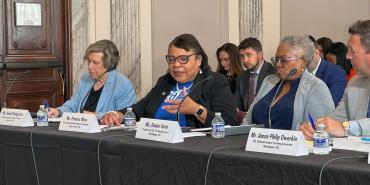The ongoing attacks on public education were the focus of a forum hosted by Sen. Mazie K. Hirono (D-Hawaii) on July 24. Several panelists, including AFT President Randi Weingarten, discussed the impact of the Trump administration's education cuts on schools and communities.
“How can we expect our schools to plan for the upcoming school year when they are confronted with chaos and uncertainty from this administration, chaos and uncertainty compounded by the threat of rescissions, which may endanger funding for education programs. That is why it's important that we continue to shine a light on these attacks on public education,” said Hirono, adding that the forum would inform students and families about the threats the administration poses to children and public schools, and give them the information and tools to fight back.
Sen. Hirono was joined at the hearing by other U.S. senators, including Lisa Blunt Rochester (D-Del.), Amy Klobuchar (D-Minn.), Adam Schiff (D-Calif.), Elizabeth Warren (D-Mass.), Peter Welch (D-Vt.), and Chris Van Hollen (D-Md.). Each asked questions of the panel, which included Weingarten; Princess Moss, vice president of the National Education Association; Denise Forte, president and CEO of EdTrust, Aaron Dworkin, CEO of the National Summer Learning Association; and Jacqueline Rodriguez, CEO of the National Center for Learning Disabilities.
Hirono blasted the Trump administration’s efforts to undermine public education and eliminate crucial programs students rely on. She noted that the administration was engaging in an “all out coordinated attack of public education,” from gutting the U.S. Department of Education's workforce and withholding education funding from school systems across the country to establishing the first national school voucher program.
NCLD's Rodriguez explained what the current attacks on the public education system mean for the disability population. The funding delay "is sabotaging student learning, educator preparedness and essential services," she said, noting that the national school voucher program will drain public education revenue and finance private schools that are not required to follow the Individuals with Disabilities Education Act.
“Private schools can and do discriminate against students with disabilities. They do so in both admission standards and disciplinary practices for most students with disabilities,” Rodriguez said. “Voucher programs are essentially not real choice. They are exclusion dressed up as opportunity.”
Dworkin stressed the importance of summer learning programs for vulnerable students, pointing out that the delay in distributing funds for summer programs led to anxiety and uncertainty for schools and families. Summer is a solution for many school leaders, policymakers and working parents, addressing issues such as childhood hunger, juvenile crime, child care for working parents, mental health support for students with special needs and academic support, said Dworkin.
Forte criticized the administration's intentional dismantling of public education to benefit the wealthy and its policies that exclude students of color, female students, LGBTQIA+ students and students with disabilities. “It's the great American heist,” Forte said. “It is a calculated effort to take what belongs to all of us―public resources, public schools and public trust―and hand it to a privileged few.”
Weingarten spoke about the need for clear communication and storytelling to make the impact of these cuts visible to the public. “We can all talk about what is taken from us, what we need to do. Even as we're doing this, we need to not just fight back, but to imagine a bold vision for our public schools and a better life for working people, and to fight for that.
“I think it's really important to put a face on these cuts and to make it clear what the effect is going to be on students,” said Weingarten. “You were able to communicate to the American people just how the effects of these actions will be,” Weingarten told lawmakers. “We are in this fight because we believe that the future of this nation lies with our children. … There's power to speaking out,” she said, adding, “Public education is a public resource. It is what we need to create an enduring democracy and opportunity and dignity for all, and we will not stop fighting for it.”
[Adrienne Coles]

